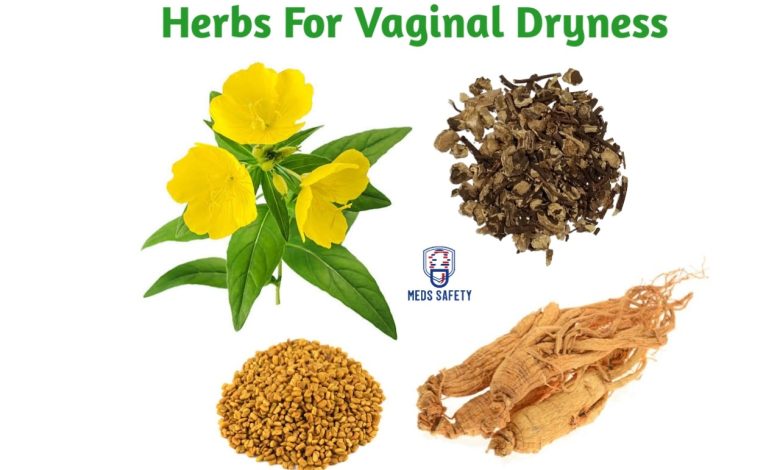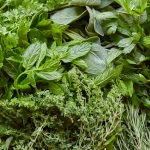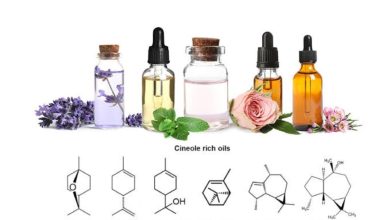List Of Top 10 Herbs For Vaginal Dryness

Vaginal dryness, also known as vaginal atrophy or atrophic vaginitis, is a common condition that affects many women, particularly during menopause or after childbirth. It occurs when the vaginal tissues become thinner, less elastic, and produce less natural lubrication. This can lead to discomfort, itching, burning sensations, and pain during sexual intercourse, impacting a woman’s overall quality of life and intimate relationships.
The primary cause of vaginal dryness is a decrease in estrogen levels. Estrogen plays a crucial role in maintaining the health and vitality of vaginal tissues, promoting blood flow, and regulating the production of vaginal fluids. As women age and approach menopause, their estrogen levels naturally decline, which can lead to the thinning and drying of vaginal tissues.
Vaginal dryness is a prevalent issue that affects a significant number of women, particularly during menopause. Studies suggest that around 40-60% of postmenopausal women experience symptoms of vaginal dryness, including discomfort and pain during sexual activity. However, it’s important to note that vaginal dryness can also impact women at other stages of life due to factors such as hormonal imbalances, medications, and certain medical conditions.
In addition to menopause, certain medical conditions and lifestyle factors can contribute to vaginal dryness. These include hormonal imbalances, autoimmune disorders, cancer treatments such as chemotherapy and radiation, certain medications like antihistamines or anti-estrogens, and even excessive stress. Smoking and excessive alcohol consumption can also exacerbate the condition by interfering with blood circulation and hormonal balance.
Fortunately, there are several treatment options available to manage vaginal dryness. Herbs have long been used in traditional medicine for their potential benefits in alleviating vaginal dryness. In this article, we’ll explore a list of herbs that have gained attention for their potential to improve vaginal health and combat dryness.
List Of top 10 Herbs For Vaginal Dryness
The list of herbs that can improve vaginal health and combat dryness include:
Black Cohosh (Actaea racemosa)
Black cohosh has gained considerable recognition for its potential to alleviate a range of menopausal symptoms, including the discomfort of vaginal dryness. This remarkable herb, native to North America, has been used for centuries by indigenous peoples for its medicinal properties.
At the heart of black cohosh’s effectiveness lies its ability to mimic the actions of estrogen within the body. Estrogen, a primary female sex hormone, plays a vital role in regulating various bodily functions, including the maintenance of healthy vaginal tissues and the production of natural lubrication. However, as women approach menopause, estrogen levels begin to decline, often leading to a host of uncomfortable symptoms, including vaginal dryness.
Black cohosh contains phytoestrogens, which are natural compounds that bear structural similarities to the body’s own estrogen molecules. When consumed, these phytoestrogens can bind to estrogen receptors in a way that imitates the hormone’s effects. This mechanism of action is thought to be the driving force behind the herb’s capacity to provide relief from menopausal discomforts.
When it comes to vaginal dryness, black cohosh’s estrogen-mimicking properties hold particular promise. By interacting with estrogen receptors, the herb assists in maintaining the health and vitality of vaginal tissues. The improved blood flow resulting from this interaction helps nourish the vaginal lining, enhancing its elasticity and thickness. Additionally, the herb’s effects on estrogen receptors can contribute to the restoration of natural lubrication, reducing the friction and discomfort experienced during sexual activity.
Fenugreek (Trigonella foenum-graecum)
Fenugreek is a potent herb that has garnered attention for its diverse range of health benefits, including its potential to address hormonal imbalances and promote vaginal moisture. This herb, native to the Mediterranean region, has been used for centuries in various traditional medicines due to its rich array of bioactive compounds.
At the core of fenugreek’s hormonal-balancing potential are its phytoestrogens, a group of naturally occurring plant compounds that resemble the structure of human estrogen. Phytoestrogens can interact with estrogen receptors in the body, producing effects that mimic those of estrogen. This property is particularly intriguing for women experiencing hormonal fluctuations, such as those encountered during menopause.
When it comes to the specific concern of vaginal dryness, fenugreek’s phytoestrogens offer a multi-faceted approach to relief. By engaging with estrogen receptors, these compounds help regulate hormonal imbalances that can contribute to the thinning and drying of vaginal tissues. The presence of phytoestrogens in the body can create a more favorable estrogenic environment, promoting the health and elasticity of vaginal walls.
Furthermore, the hormonal modulation provided by fenugreek’s phytoestrogens can have a positive impact on the body’s natural moisture production. Adequate estrogen levels are crucial for the stimulation of vaginal lubrication, ensuring a comfortable and friction-free experience during sexual activity. By promoting hormonal balance, fenugreek can indirectly contribute to maintaining optimal levels of vaginal moisture.
Ginseng (Panax ginseng)
Ginseng, a revered herb in traditional medicine, has gained recognition for its adaptogenic qualities, which aid the body in managing stress and promoting overall well-being. This remarkable herb, available in various species such as Panax ginseng and Panax quinquefolius (American ginseng), has been used for centuries in cultures across the world for its therapeutic potential.
Central to ginseng’s adaptogenic nature is its ability to modulate the body’s stress response. In times of stress, the adrenal glands release hormones like cortisol, which, when chronically elevated, can disrupt hormonal balance and impact various bodily functions. Ginseng, when consumed regularly, has been suggested to help regulate cortisol levels, allowing the body to better adapt to stressors without causing hormonal imbalances that can contribute to vaginal dryness.
However, ginseng’s benefits extend beyond stress management. Research suggests that this herb may also play a role in enhancing blood circulation, including to the genital area. Improved blood flow can have a positive impact on the health of the vaginal tissues and their ability to self-lubricate. By supporting better circulation to the genital region, ginseng may contribute to a more responsive and moist vaginal environment, thereby reducing discomfort associated with dryness.
The potential of ginseng to promote vaginal lubrication aligns with its reputation for boosting vitality and overall energy levels. As blood flow improves, the tissues in the vaginal area receive enhanced oxygen and nutrients, which are essential for maintaining their health and elasticity. The combination of reduced stress response and improved circulation underscores ginseng’s potential to address the multifaceted issue of vaginal dryness.
Evening Primrose (Oenothera biennis)
Evening primrose oil, derived from the seeds of the evening primrose plant (Oenothera biennis), is recognized for its rich content of gamma-linolenic acid (GLA), an essential fatty acid with a host of health benefits. This remarkable oil has captured attention for its potential to support healthy skin, mucous membranes, and, importantly, vaginal tissue hydration.
At the core of evening primrose oil’s effectiveness lies its significant concentration of GLA. Essential fatty acids like GLA play a pivotal role in maintaining the integrity and fluidity of cell membranes throughout the body. In particular, GLA has been shown to be beneficial for the production of prostaglandins—hormone-like compounds that regulate various physiological processes, including inflammation and hydration. When it comes to vaginal health, prostaglandins are crucial for maintaining the proper balance of moisture in the mucous membranes.
By supplementing the body with GLA through evening primrose oil, individuals can contribute to the health and hydration of vaginal tissues. GLA supports the production of prostaglandins that are essential for maintaining the integrity of mucous membranes, including those in the vaginal area. This helps create an environment where the vaginal tissues remain adequately hydrated, reducing the discomfort and irritation often associated with dryness.
Furthermore, evening primrose oil’s ability to nourish skin and mucous membranes goes beyond hydration. It can also support the body’s natural healing processes, aiding in the repair of any micro-damage that might occur due to friction, irritation, or hormonal imbalances. By promoting tissue health and regeneration, evening primrose oil contributes to the overall resilience and well-being of the vaginal area.
Chasteberry (Vitex agnus-castus)
Chasteberry, scientifically known as Vitex agnus-castus, is an herb that has a long history of traditional use for its potential to balance hormones and provide relief from various symptoms associated with menstrual cycles. This herb, often referred to simply as “Vitex,” has gained attention for its ability to regulate hormonal fluctuations, which may extend to addressing the discomfort of vaginal dryness.
One of the primary mechanisms through which chasteberry exerts its effects is by influencing the pituitary gland, which plays a key role in regulating hormone production. Chasteberry is believed to have an impact on the secretion of luteinizing hormone (LH) while suppressing the release of follicle-stimulating hormone (FSH). This shift in hormone levels can lead to a more balanced ratio of estrogen to progesterone, contributing to hormonal equilibrium and potentially alleviating the hormonal imbalances that can lead to vaginal dryness.
Hormonal fluctuations, especially those experienced during various stages of the menstrual cycle and menopause, can impact vaginal tissues and lubrication. Chasteberry’s potential to regulate hormones might help create a more stable hormonal environment, reducing the severity of vaginal dryness and promoting a more comfortable vaginal milieu.
Sage (Salvia officinalis)
Sage is an aromatic herb with a rich history in both culinary and medicinal applications, holds potential benefits for women’s health, including the management of vaginal dryness. This herb’s unique composition of compounds, along with its historical use, suggests that it might offer relief from the discomfort of dryness while supporting overall vaginal health.
One of the notable attributes of sage is its possession of compounds with estrogen-like effects. These phytoestrogens, share structural similarities with the hormone estrogen found in the human body. When consumed, these phytoestrogens can interact with estrogen receptors, potentially mitigating the effects of hormonal imbalances that contribute to vaginal dryness. By exerting mild estrogenic actions, sage may assist in maintaining the health and lubrication of vaginal tissues.
Moreover, sage boasts anti-inflammatory properties that extend beyond its hormonal effects. Inflammation is often linked to various health concerns, including vaginal discomfort. By reducing inflammation, sage might alleviate not only the symptoms of dryness but also any associated irritation or soreness. A calmer, less inflamed environment within the vaginal tissues can contribute to improved comfort and overall vaginal health.
Calendula (Calendula officinalis)
Calendula, commonly known as marigold, is a vibrant and versatile herb that has gained popularity for its therapeutic properties, particularly its potential to provide relief from various skin and mucous membrane discomforts, including those related to vaginal dryness. This gentle yet potent herb offers a natural approach to addressing discomfort by leveraging its anti-inflammatory and soothing attributes.
At the heart of calendula’s effectiveness is its wealth of compounds with anti-inflammatory properties. Inflammation is a common underlying factor in many discomforts, and vaginal dryness can lead to irritation and soreness. Calendula’s ability to reduce inflammation within the vaginal tissues can lead to a more comfortable and less painful experience.
Additionally, calendula’s soothing properties contribute to its potential benefits for vaginal health. Its gentle nature can help alleviate discomfort by providing a protective and calming layer over sensitive tissues. This soothing effect is particularly valuable for addressing the dryness-related discomfort experienced during daily activities and sexual intimacy.
Calendula’s versatility allows for various methods of application. Topical creams or ointments infused with calendula extract can be applied directly to the affected area, providing localized relief from discomfort. Calendula-infused sitz baths or warm water rinses can also offer broader soothing effects, promoting a sense of overall comfort and vaginal well-being.
Red Clover (Trifolium pratense)
Red clover (Trifolium pratense), a leguminous plant known for its vibrant pink-purple blossoms, offers a promising avenue for addressing vaginal dryness through its rich content of isoflavones. These compounds have garnered attention for their potential to mimic estrogen-like effects in the body, contributing to hormonal balance and promoting vaginal moisture.
Isoflavones a type of phytoestrogen share structural similarities with human estrogen. When consumed or applied topically, they can interact with estrogen receptors, offering a mild estrogenic effect. This interaction can be particularly beneficial for women experiencing hormonal imbalances that contribute to vaginal dryness. By promoting hormonal equilibrium, red clover’s isoflavones might alleviate the discomfort associated with dryness.
Regular consumption of red clover, whether in the form of teas, tinctures, or supplements, can provide a steady supply of isoflavones to the body. Topical applications, such as creams or oils infused with red clover extract, offer targeted relief to the vaginal area. These applications can support the mucous membranes, potentially enhancing their ability to maintain moisture and minimize discomfort.
Furthermore, red clover’s potential benefits extend beyond hormonal balance. It’s worth noting that red clover is also known for its antioxidant properties, which can contribute to overall tissue health and support the body’s natural healing processes. By promoting the well-being of the vaginal tissues, red clover complements its potential estrogen-like effects, creating a comprehensive approach to vaginal comfort.
Dong Quai (Angelica sinensis)
Dong Quai commonly referred to as the “female ginseng,” is a herb that holds a special place in traditional Chinese medicine for its potential to address a range of women’s health concerns. This revered herb has gained attention for its historical use in balancing hormones and promoting overall well-being, making it a potential candidate for alleviating the discomfort of vaginal dryness.
Central to Dong Quai’s reputation is its impact on hormonal balance. Traditional Chinese medicine has long recognized its potential to regulate the female reproductive system and address hormonal imbalances. By promoting harmony within the endocrine system, Dong Quai might play a role in maintaining proper levels of estrogen and progesterone, addressing the root causes of hormonal fluctuations that contribute to vaginal dryness.
Additionally, Dong Quai’s potential benefits for vaginal dryness align with its broader role in women’s health. Its historical use in tonifying the blood and promoting circulation can potentially enhance blood flow to the vaginal area, thereby supporting the health of vaginal tissues and the production of natural lubrication.
Wild Yam (Dioscorea villosa)
Wild yam is a versatile plant native to North America, and has gained recognition for its potential to address hormonal imbalances through its content of diosgenin. This natural compound can be converted by the body into both progesterone and estrogen, making wild yam a valuable consideration for those seeking to regulate hormonal fluctuations that contribute to conditions like vaginal dryness.
Diosgenin, found in wild yam, has structural similarities to human hormones, particularly progesterone and estrogen. While the body cannot directly convert diosgenin into these hormones, it can be transformed into a precursor that serves as a building block for their production. This ability to indirectly influence hormone levels offers wild yam its reputation as a possible ally in hormone-related imbalances, which can manifest as vaginal dryness.
Regulating hormones is pivotal for vaginal health. As women experience hormonal shifts, particularly during menopause, fluctuations in estrogen and progesterone levels can lead to dryness and discomfort. By potentially supporting the body’s hormone production, wild yam could contribute to maintaining the proper balance of these hormones, thereby alleviating the symptoms associated with vaginal dryness.
Wild yam is often available in various forms, such as creams, supplements, or tinctures. Topical creams containing wild yam extract are commonly used and may offer localized benefits, particularly for vaginal dryness. Supplements, when used under the guidance of a healthcare professional, can provide a systemic approach to hormonal balance.
Conclusion
While these herbs show promise in addressing vaginal dryness, it’s crucial to approach their use with caution and consult a healthcare professional before integrating them into your routine, especially if you have underlying medical conditions or are taking medications. Natural remedies can be effective complements to medical treatments, but individual responses may vary. A holistic approach to vaginal health, including a balanced diet, regular exercise, proper hydration, and open communication with your healthcare provider, can contribute to overall well-being and alleviate the discomfort of vaginal dryness.





